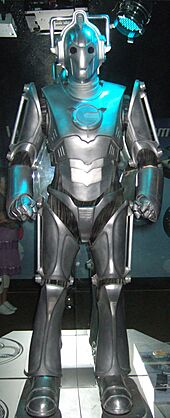Doctor Who facts for kids
Quick facts for kids Doctor Who |
|
|---|---|

Logo (2023)
|
|
| Genre | |
| Created by |
|
| Written by | Various |
| Starring |
|
| Theme music composer | Ron Grainer |
| Opening theme | Doctor Who theme music |
| Composer(s) |
|
| Country of origin | United Kingdom |
| Original language(s) | English |
| No. of seasons | 26 (1963–1989) |
| No. of episodes |
|
| Production | |
| Executive producer(s) |
|
| Camera setup |
|
| Running time |
50 minutes
Regular episodes:
Specials: Various: 50–90 minutes |
| Production company(s) | BBC Studios Productions Bad Wolf
|
| Release | |
| Original network | BBC1 |
| Original release | 23 November 1963 – 6 December 1989 |
| Chronology | |
| Related shows |
|
Doctor Who is a British science fiction TV show that has been on the BBC since 1963. It was created by Sydney Newman, C. E. Webber, and Donald Wilson. The show is about the amazing adventures of an alien known as the Doctor. The Doctor is part of a human-like species called Time Lords.
The Doctor travels through the universe and time in a special time-traveling spaceship called the TARDIS. From the outside, the TARDIS looks like an old British police box. While traveling, the Doctor tries to save lives and help people who are being treated unfairly. The Doctor often travels with friends called companions.
Many actors have played the Doctor. The first was William Hartnell. As of 2023, Ncuti Gatwa plays the Fifteenth Doctor. When one actor leaves, the story explains it as the Doctor "regenerating" into a new body. This means the Doctor's cells change, and they get a new look and personality. Each actor plays the Doctor differently, but they are all the same character. Sometimes, different versions of the Doctor even meet each other! In 2017, Jodie Whittaker became the first woman to play the Thirteenth Doctor.
Doctor Who is a very important part of popular culture in Britain and around the world. It has a huge fan base, and many people who work in TV today grew up watching it. Fans of the show are often called Whovians. The show holds Guinness World Records for being the longest-running science fiction TV series ever. It's also known as the "most successful" science fiction series based on its ratings, DVD sales, and book sales.
The show first ran from 1963 to 1989. There was a TV movie in 1996 that tried to bring it back, but it didn't lead to a new series. However, Doctor Who was relaunched in 2005. It was made by BBC Wales in Cardiff. Since 2023, it's been made by Bad Wolf and BBC Studios Productions in Cardiff. Doctor Who has also led to many spin-off shows, like Torchwood (2006–2011), The Sarah Jane Adventures (2007–2011), K9 (2009–2010), and Class (2016).
What is Doctor Who About?
Doctor Who is about a mysterious Time Lord known only as "the Doctor". The Doctor ran away from their home planet, Gallifrey. They stole a TARDIS, which stands for "Time and Relative Dimension(s) in Space." It's a time machine that can appear and disappear anywhere in time and space.
The TARDIS is much bigger on the inside than it is on the outside. It has a "chameleon circuit" that's supposed to make it look like something common in its surroundings. But the Doctor's TARDIS has a broken chameleon circuit, so it always looks like a blue British police box.
As the Doctor travels, they often find bad things happening. They try to stop evil forces from hurting innocent people or changing history. The Doctor uses their cleverness and tools like the sonic screwdriver. The Doctor rarely travels alone and usually has one or more companions with them. These friends are often humans because the Doctor is fascinated by Earth. The Doctor also sometimes works with UNIT, a military group that protects Earth.
The Doctor is hundreds of years old. As a Time Lord, they can regenerate when they are badly hurt. This means they get a new body and face. The Doctor has many enemies, like the Daleks, the Cybermen, and the evil Time Lord the Master.
How Doctor Who Started and Grew
Doctor Who was first meant to be a family show that taught people things. It used time travel to explore science and famous historical events. In 1963, writer Terry Nation created a story called The Mutants. This story introduced the Daleks. At first, the BBC didn't want "bug-eyed monsters" in the show. But they didn't have other scripts ready, so they made it. The Daleks became super popular, leading to "Dalekmania" and lots of merchandise.
The first episode aired on BBC Television Service on November 23, 1963. It was 80 seconds late because of news about the assassination of John F. Kennedy. Each episode was 25 minutes long and aired weekly. Sydney Newman was key in developing the show. Other important people included Donald Wilson, C. E. Webber, Anthony Coburn, David Whitaker, and producer Verity Lambert.
The BBC made the show for 26 seasons. The first actor to play the Doctor, William Hartnell, had to leave because of his health. Patrick Troughton took over in 1966. In 1970, Jon Pertwee became the Doctor, and the show started being made in color. Tom Baker became the Doctor in 1974. His unique style made the show very popular again.
After seven years, Baker was replaced by Peter Davison in 1981, then Colin Baker in 1984. In 1985, the BBC tried to cancel the show, but it came back after 18 months. Colin Baker was then replaced by Sylvester McCoy. But with fewer viewers and a less popular time slot, the show stopped production in 1989. Even though it was cancelled, the BBC kept saying it would return.
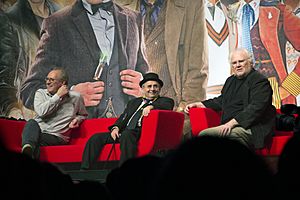
The BBC tried to bring the show back with an independent company. Philip Segal worked with the BBC, Fox, Universal Pictures, and BBC Worldwide. This led to a Doctor Who TV movie in 1996, starring Paul McGann as the Doctor. It was popular in the UK but not in the US, so a new series wasn't made then.
For a while, new Doctor Who stories were only in books and audio plays. In 2003, BBC Television announced a new series would be made. The 2005 revival of Doctor Who directly continued the original show from 1963–1989 and the 1996 TV movie. Russell T Davies and Julie Gardner were the main producers. From 2005, the show changed how it was filmed, using a single camera instead of multiple cameras.
Christopher Eccleston played the Doctor when the show returned on March 26, 2005, with the episode "Rose". He left after one series and David Tennant took over. Russell T Davies left in 2009. Steven Moffat became the new showrunner, and Matt Smith became the new Doctor. Smith left in 2013, the show's 50th anniversary year, and Peter Capaldi took his place.
In 2016, Moffat announced he would leave after the 2017 finale. Chris Chibnall took over in 2018. Jodie Whittaker became the first female Doctor and starred in three series.
Both Whittaker and Chibnall left after special episodes in 2022. Russell T Davies returned as showrunner for the 60th anniversary specials. Now, Bad Wolf co-produces the series with BBC Studios Productions.
Episodes of Doctor Who
The original Doctor Who ran for 26 seasons from 1963 to 1989. In the early days, each weekly episode was part of a longer story, usually with four to six parts. Later, stories often had three or four parts. Some stories were much longer, like The Daleks' Master Plan (12 episodes) or The Trial of a Time Lord (14 episodes). Sometimes, stories across a season were loosely connected by a bigger plot.
The show was meant to be educational and for families on Saturday evenings. It would switch between stories set in the past, teaching history, and stories in the future or space, focusing on science. The Doctor's first companions included a science teacher and a history teacher.
However, science fiction stories became more popular. The history-focused episodes were stopped after The Highlanders in 1967. While the show still used historical settings, they were usually just backgrounds for sci-fi adventures. One exception was Black Orchid (1982), set in 1920s England.
In the early years, stories flowed into each other, and each episode had its own title. Later, each full story was given a title, and the parts were numbered as episodes. Robert Holmes wrote the most stories for the show. Douglas Adams, famous for Hitchhiker's Guide to the Galaxy, also wrote for Doctor Who.
When the show returned in 2005, the format changed. A "series" usually had thirteen 45-minute episodes. These episodes were often stand-alone but sometimes linked by a bigger story arc that ended in the series finale. Each episode has its own title. Sometimes, episodes are longer than 45 minutes, especially Christmas specials.
851 Doctor Who episodes have been shown since 1963. They have ranged from 25-minute episodes (common in the classic era) to 45/50-minute episodes (common since 2005). There have also been longer specials, like the 1983 film The Five Doctors and the 1996 TV movie. Many Christmas specials are about 60 minutes long.
Mini-episodes, about eight minutes long, were made for charity events like Children in Need. For example, Dimensions in Time (1993) was a two-part story made with the cast of the soap opera EastEnders. Starting in 2009, the show began filming in HDTV.
To celebrate the show's 50th anniversary, a special 3D episode, "The Day of the Doctor", was shown in 2013. David Tennant and Billie Piper returned for this episode, which also had a limited release in cinemas worldwide.
Main Characters in Doctor Who
The Doctor
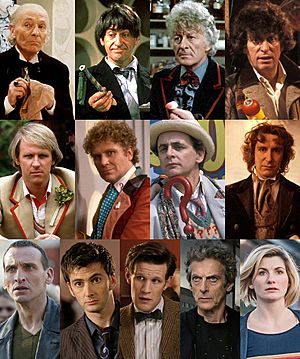
At first, the Doctor was a mystery. In the early days, the character was an unusual alien traveler. They were very smart and fought against unfairness while exploring time and space in their unreliable time machine, the "TARDIS". The TARDIS is famously much bigger on the inside than the outside.
The Doctor, who was a bit grumpy at first, soon became more caring. It was later revealed that the Doctor is a Time Lord, an alien from the planet Gallifrey. The Doctor stole the TARDIS to escape Gallifrey.
How the Doctor Changes Appearance
The show's creators came up with the idea of regeneration so that a new actor could play the main character. This happened because the first star, William Hartnell, became unwell. The word "regeneration" wasn't used until the third Doctor changed. Before that, it was called a "renewal" or "change of appearance." This idea has allowed many actors to play the Doctor over the years.
Stories like The Deadly Assassin (1976) and Mawdryn Undead (1983) said that a Time Lord could only regenerate 12 times, meaning 13 different bodies. This rule became well-known. However, in the episode "The Time of the Doctor" (2013), the Doctor got a new set of regenerations.
Even though writers had suggested casting a woman as the Doctor many times, all official Doctors were men until 2017. Jodie Whittaker became the Thirteenth Doctor at the end of the 2017 Christmas special, making her the first woman to play the role.
When Jodie Whittaker left in "The Power of the Doctor" (2022), she regenerated into a form played by David Tennant. He became the Fourteenth Doctor, the first actor to play two different versions of the Doctor. In the same year, Ncuti Gatwa was announced as the Fifteenth Doctor, making him the first Black actor to lead the series.
| Main Actor | Doctor's Version | Years Played |
|---|---|---|
| William Hartnell | First Doctor | 1963–1966 |
| Patrick Troughton | Second Doctor | 1966–1969 |
| Jon Pertwee | Third Doctor | 1970–1974 |
| Tom Baker | Fourth Doctor | 1974–1981 |
| Peter Davison | Fifth Doctor | 1982–1984 |
| Colin Baker | Sixth Doctor | 1984–1986 |
| Sylvester McCoy | Seventh Doctor | 1987–1989 |
| Paul McGann | Eighth Doctor | 1996 |
| Christopher Eccleston | Ninth Doctor | 2005 |
| David Tennant | Tenth Doctor | 2005–2010 |
| Matt Smith | Eleventh Doctor | 2010–2013 |
| Peter Capaldi | Twelfth Doctor | 2014–2017 |
| Jodie Whittaker | Thirteenth Doctor | 2018–2022 |
| David Tennant | Fourteenth Doctor | 2023 |
| Ncuti Gatwa | Fifteenth Doctor | 2023–present |
Other actors have played versions of the Doctor in guest roles. In 2013, John Hurt played a previously unknown version called the War Doctor. He appeared before the 50th-anniversary special "The Day of the Doctor". Later, Jo Martin played another unknown past Doctor called the Fugitive Doctor.
Sometimes, other actors have filled in for the main Doctor. For example, Richard Hurndall played the First Doctor in The Five Doctors because William Hartnell had passed away. David Bradley later played the First Doctor in "Twice Upon a Time".
Companions
Companions, usually humans, have always been a part of Doctor Who since 1963. One of their jobs is to remind the Doctor about what is right. The Doctor's first companions were his granddaughter Susan Foreman (Carole Ann Ford) and her teachers Barbara Wright (Jacqueline Hill) and Ian Chesterton (William Russell). These characters helped the audience learn about the mysterious Doctor. The only time the Doctor traveled alone in the original series was in "The Deadly Assassin" (1976).
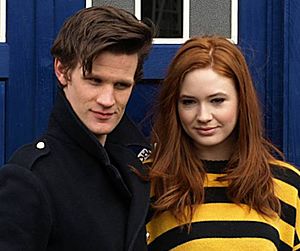
Companions help the story by asking the Doctor questions and getting into trouble that the Doctor has to solve. The Doctor often gets new companions and loses old ones. Some go home, find new purposes, or even fall in love on other planets. Some have sadly died during the series.
Since the 2005 revival, the Doctor usually travels with a main female companion who has a bigger role in the story. Steven Moffat, a former showrunner, said the companion is like the main character because the story changes more for them than for the Doctor. Famous companions from the newer series include Rose Tyler (Billie Piper), Martha Jones (Freema Agyeman), and Donna Noble (Catherine Tate).
The Eleventh Doctor traveled with a married couple, Amy Pond (Karen Gillan) and Rory Williams (Arthur Darvill). He also had ongoing adventures with River Song (Alex Kingston) and Clara Oswald (Jenna Coleman). The tenth series featured the alien Nardole (Matt Lucas) and introduced Pearl Mackie as Bill Potts, the Doctor's first openly gay companion. The Thirteenth Doctor traveled with Ryan Sinclair (Tosin Cole), Graham O'Brien (Bradley Walsh), Yasmin Khan (Mandip Gill), and Dan Lewis (John Bishop).
Some companions have returned in the main show or in spin-offs. Sarah Jane Smith became the main character in The Sarah Jane Adventures (2007–2011). Jack Harkness also got his own spin-off, Torchwood (2006–2011).
Foes
When Doctor Who was first planned, creator Sydney Newman didn't want typical "bug-eyed monsters." But monsters were popular with viewers and quickly became a key part of the show. The Daleks, Cybermen, and the Master are some of the most famous enemies the Doctor has fought.
When the show returned in 2005, executive producer Russell T Davies wanted to bring back classic monsters. The Autons and Daleks returned in the first series. Steven Moffat, who took over later, brought back the Silurians and Zygons. The new series has also introduced new recurring aliens like the Slitheen, Ood, Judoon, Weeping Angels, and the Silence.
Daleks
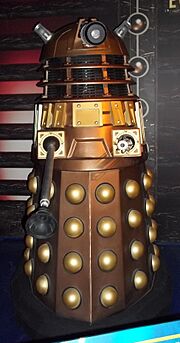
The Daleks are Doctor Who's oldest villains, first appearing in the show's second story in 1963. They are Kaleds from the planet Skaro. They were changed by the scientist Davros and put inside metal armor shells to move around. The creatures inside look like octopuses with big brains. Their armor has one eye-stalk, a plunger-like arm, and a powerful directed-energy weapon.
Their main weakness is their eye-stalk; if it's damaged, a Dalek can go crazy. Their main goal, which they often shout in their metallic voices, is to "exterminate" all non-Dalek beings. They even fought the Time Lords in the Time War. They still appear in Doctor Who, most recently in "The Power of the Doctor" (2022). Davros, their creator, has also appeared many times.
Writer Terry Nation created the Daleks, intending them to be like the Nazis. BBC designer Raymond Cusick designed them. Their first appearance made both the Daleks and Doctor Who very popular. A Dalek even appeared on a British postage stamp in 1999. In "Victory of the Daleks", new Daleks were introduced that came in different colors, with each color showing their role.
Cybermen
Cybermen were originally human-like beings from Earth's twin planet Mondas. They started replacing more and more of their body parts with artificial ones. This made them cold, logical cyborgs, who usually only showed emotion when they were angry. When Mondas was destroyed, they found a new home planet called Telos. They are still a common enemy in Doctor Who.
The Cybermen have changed a lot over the show's history. They were brought back in the 2006 series as aliens from a different universe, with new backstories. The classic Cybermen returned in "Closing Time", keeping their 2006 look. In the 2020 series, the Cybermen teamed up with the Master and gained the ability to regenerate.
The Master
The Master is the Doctor's main enemy. They are a rogue Time Lord who wants to rule the universe. The character was created to be like "Professor Moriarty to the Doctor's Sherlock Holmes". The Master first appeared in 1971. Like the Doctor, the Master can regenerate, so many actors have played the role. The first was Roger Delgado, who played the Master until his death in 1973.
Peter Pratt and Geoffrey Beevers briefly played the Master, then Anthony Ainley took over until the show stopped in 1989. The Master returned in the 1996 TV movie, played by American actor Eric Roberts.
After the show's revival in 2005, Derek Jacobi brought the character back in "Utopia" (2007). In that story, John Simm then took over the role and returned many times. In "Dark Water" (2014), it was revealed that the Master had regenerated into a female form, called "Missy" (Michelle Gomez). Simm returned to play the Master alongside Gomez in the tenth series. The Master returned for the twelfth series (2020) with Sacha Dhawan in the role.
Music in Doctor Who
Theme Music
The Doctor Who theme music was one of the first electronic TV theme songs. After more than 50 years, it's still very recognizable. Ron Grainer composed the original theme. Delia Derbyshire of the BBC Radiophonic Workshop created the sounds, with help from Dick Mills. This version was used until 1980. It's famous for being an early electronic music piece, made before modern synthesizers.
Derbyshire created each sound by cutting, splicing, and changing the speed of analog tapes. These tapes had recordings of a plucked string, white noise, and simple sounds from test-tone machines. She even invented new ways to mix the music. When Grainer heard it, he asked, "Jeez, Delia, did I write that?" She replied, "Most of it." She didn't get on-screen credit until the 50th-anniversary story in 2013.
New versions of the theme were made over the years by Peter Howell (1980), Dominic Glynn (1986), and Keff McCulloch (1987). John Debney created a new version for the 1996 TV movie. For the show's return in 2005, Murray Gold made a new arrangement, using parts of the 1963 original.
Murray Gold made new versions of the theme in 2007 and 2010. In 2011, the theme song was voted into Classic FM's Hall of Fame. A new version of Gold's theme debuted in the 2012 Christmas special "The Snowmen". Another update was made for the 50th-anniversary special "The Day of the Doctor" in 2013.
Versions of the "Doctor Who Theme" have also been released as pop songs. In the 1970s, Jon Pertwee (the Third Doctor) recorded a version with spoken lyrics. In 1978, the group Mankind released a disco version that reached number 24 in the UK charts. In 1988, The Timelords (later The KLF) released "Doctorin' the Tardis", which hit No. 1 in the UK. Many other artists have covered or reinterpreted the theme.
In 2018, Segun Akinola became the composer for series 11.
Background Music
Most of the background music for Doctor Who is specially created by composers. In the early years, some episodes also used existing music. Since 2005, the show has sometimes used pop music from the 1970s to the 2000s.
Norman Kay wrote the music for the first Doctor Who adventure. Tristram Cary, an electronic music pioneer, scored many early stories. Dudley Simpson was the most frequent composer for the first 15 years, writing music for many adventures in the 1960s and 1970s.
In 1980, the BBC Radiophonic Workshop started creating the background music. Paddy Kingsland and Peter Howell contributed many scores. The Radiophonic Workshop stopped after 1986. Keff McCulloch then became the main composer until the show ended in 1989.
From 2005 to 2017, Murray Gold and Ben Foster composed all the background music. The BBC National Orchestra of Wales performed it. Concerts featuring the show's music have been held, including a Doctor Who Prom at the Royal Albert Hall in 2008.
Several soundtracks have been released since 2005, featuring music from different series and specials. In 2013, a 50th-anniversary CD box set was released with music and sounds from the show's history.
Other Doctor Who Appearances
Films
There are two Dr. Who movies: Dr. Who and the Daleks (1965) and Daleks' Invasion Earth 2150 A.D. (1966). These films retell early TV stories but with bigger budgets and some changes. In these movies, Peter Cushing plays a human scientist named "Dr. Who" who travels with his family in his own time machine.
Paul McGann starred in the only TV movie as the Eighth Doctor. After the movie, he continued the role in audio dramas. His Doctor was later confirmed as part of the main show's history.
Spin-offs
Doctor Who has also appeared on stage. In the 1970s, Trevor Martin played the Doctor in Doctor Who and the Daleks in the Seven Keys to Doomsday. In the 1980s, Jon Pertwee and Colin Baker both played the Doctor in a play called Doctor Who – The Ultimate Adventure.
A pilot episode for a spin-off called K-9 and Company aired in 1981. It starred Elisabeth Sladen as companion Sarah Jane Smith and John Leeson as the voice of K9, but it didn't become a full series.
After the success of the 2005 series, the BBC created a 13-part spin-off called Torchwood. It's an anagram of "Doctor Who" and is set in modern-day Cardiff. It follows a team investigating alien activities. John Barrowman returned as Jack Harkness from Doctor Who.
The Sarah Jane Adventures, starring Elisabeth Sladen as Sarah Jane Smith, was made for CBBC. A special aired in 2007, and a full series began later that year. David Tennant (the Tenth Doctor) and Matt Smith (the Eleventh Doctor) both appeared in this show. The series ended after five seasons because Elisabeth Sladen passed away in 2011.
An animated series called The Infinite Quest aired in 2007. Another animated series, Dreamland, aired in 2009.
Class, about students at Coal Hill School, aired online in 2016. Peter Capaldi (the Twelfth Doctor) appeared in the first episode. This series was cancelled in 2017.
In 2023, Russell T Davies confirmed that more Doctor Who spin-offs are being planned. One will focus on UNIT and star Jemma Redgrave as Kate Stewart.
Aftershows
When Doctor Who returned in 2005, the BBC created an aftershow called Doctor Who Confidential. This show went behind the scenes of Doctor Who, showing how it was made and featuring interviews with the cast and crew. Later aftershows included Doctor Who Extra and Doctor Who: The Fan Show. The latest one is Doctor Who: Unleashed, which started in 2023.
| Series | Episodes | First aired | Last aired | Narrator / Presenter |
|---|---|---|---|---|
| Doctor Who Confidential | 87 | 26 March 2005 | 1 October 2011 | David Tennant (2005) Simon Pegg (2005) Mark Gatiss (2005–2006) Anthony Head (2006–2010) Noel Clarke (2009) Alex Price (2010) Russell Tovey (2010–2011) |
| Doctor Who Extra | 90 | 23 August 2014 | 5 December 2015 | Matt Botten Rufus Hound Matt Lucas Charity Wakefield |
| Doctor Who: The Fan Show | 166 | 8 May 2015 | 3 August 2018 | Christel Dee (main host) Luke Spillane (co-host) |
| Doctor Who: Access All Areas | 10 | 13 October 2018 | 13 December 2018 | Yinka Bokinni |
| Doctor Who: Unleashed | Lua error: bad argument #1 to 'gsub' (string expected, got nil). | 17 November 2023 | present | Steffan Powell |
Charity Episodes and Appearances
In 1983, for the show's 20th anniversary, The Five Doctors was shown as part of the BBC's annual Children in Need Appeal. It was 90 minutes long and featured three of the first five Doctors.
In 1993, for the 30th anniversary, another charity special called Dimensions in Time was made for Children in Need. It featured all the surviving actors who played the Doctor and many past companions. It also crossed over with the soap opera EastEnders. This special was made in 3D, using special glasses.
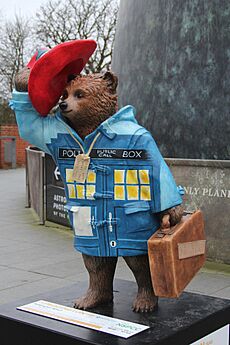
In 1999, a special called Doctor Who and the Curse of Fatal Death was made for Comic Relief. It was a funny parody of the show. The Doctor (Rowan Atkinson) had to regenerate many times, with different actors playing him, including Richard E. Grant, Jim Broadbent, Hugh Grant, and Joanna Lumley. Steven Moffat, who later became a main writer for the show, wrote the script.
Since Doctor Who returned in 2005, two original "mini-episodes" have been made for Children in Need. The first, in 2005, introduced David Tennant as the Tenth Doctor. The second, "Time Crash" (2007), showed the Tenth Doctor meeting the Fifth Doctor, Peter Davison.
Two mini-episodes, "Space" and "Time", were made for Comic Relief in 2011. In 2014, Peter Capaldi (the Twelfth Doctor) designed a Doctor Who-themed Paddington Bear statue for a charity auction.
Museums and Exhibitions
There have been many Doctor Who exhibitions in the UK, including ones in Blackpool, Llangollen, and Cardiff (where the show is filmed).
Merchandise
Since it began, Doctor Who has created hundreds of products. These include toys, games, collectible cards, and postage stamps. Many games feature the Daleks.
Audio
The first Doctor Who audio release was a short version of the TV story The Chase in 1966. In 1976, the first original audio story, Doctor Who and the Pescatons, was released. In 1988, Slipback became the first radio drama.
Since 1999, Big Finish Productions has released many Doctor Who audio stories on CD. These often feature actors who played the Doctor or companions in the TV show. Big Finish Productions holds a Guinness World Record for the longest-running science fiction audio play series. In 2020, they announced they would change their release format.
In 2022, BBC Sounds started a 10-episode podcast called Doctor Who: Redacted. It stars Charlie Craggs and Jodie Whittaker and is about friends who host a paranormal podcast.
Books
Doctor Who books have been published since the mid-1960s. From 1965 to 1991, most books were novelizations (book versions) of TV episodes. In 1991, new original stories were launched. Since the show returned in 2005, BBC Books has published new novels. Many non-fiction books about the series have also been released.
A magazine called Doctor Who Magazine (DWM) has been published regularly since 1979. DWM is recognized by Guinness World Records as the longest-running TV tie-in magazine. There's also Doctor Who Adventures magazine for younger fans.
Awards and Recognition
Doctor Who is known as one of Britain's best TV shows. It won the 2006 British Academy Television Award for Best Drama Series and five National Television Awards in a row (2005–2010). In 2011, Matt Smith was the first Doctor to be nominated for a BAFTA Television Award for Best Actor. In 2016, Michelle Gomez was the first woman to get a BAFTA nomination for the series, for her role as Missy.
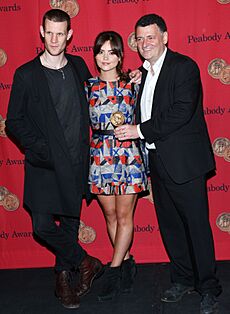
In 2013, the Peabody Awards honored Doctor Who for "evolving with technology and the times." The show is in the Guinness World Records as the longest-running science fiction TV show. It's also the "most successful" sci-fi series based on ratings, sales, and online traffic. Its 50th-anniversary special had the largest ever simulcast (shown at the same time) of a TV drama.
In 1975, Season 11 won a Writers' Guild of Great Britain award for Best Writing in a Children's Serial. In 1996, Doctor Who was voted the "Best Popular Drama" the BBC had ever made. In 2000, it was ranked third in a list of the 100 Greatest British Television Programmes of the 20th century. In 2005, SFX magazine called it "The Greatest UK Science Fiction and Fantasy Television Series Ever."
The revived series has won many awards. It won five BAFTA TV Awards, including Best Drama Series. It also won 25 BAFTA Cymru Awards. It was nominated for 7 Saturn Awards, winning Best International Series once. In 2009, Channel 4 voted Doctor Who the 3rd greatest show of the 2000s.
The show has won the Hugo Award for Best Dramatic Presentation, Short Form six times since 2006. These awards are for science fiction and fantasy films and series. Winning episodes include "The Empty Child"/"The Doctor Dances" (2006) and "Blink" (2008). Matt Smith won Best Actor at the 2012 National Television Awards, and Karen Gillan won Best Actress.
In 2019, Doctor Who was added to the Science Fiction Hall of Fame in Seattle.
See also
 In Spanish: Doctor Who para niños
In Spanish: Doctor Who para niños
- Time travel in fiction
- List of Welsh television series
 | Georgia Louise Harris Brown |
 | Julian Abele |
 | Norma Merrick Sklarek |
 | William Sidney Pittman |


